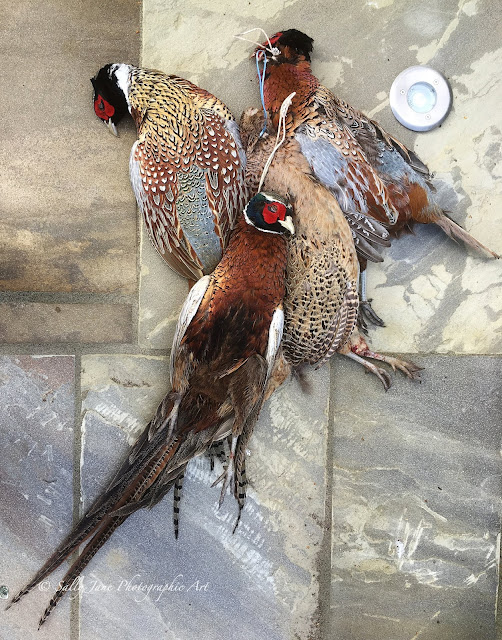Things aren't always as they seem
Just because it's dead on a road doesn't always mean it's roadkill. When I came across this mallard a few days ago I was initially surprised. Ducks seldom get hit by cars as they don't tend to spend any time foraging at roadside verges like pheasants. This one was in excellent condition and nice and fresh so I was pleased with the find especially as I didn't have any duck in my freezer. Duck don't generally require much hanging so I only hung this one for a couple of days before plucking. Having never plucked a duck before I was quite amazed by the density of the feathers. The back and chest plucked much easier than a pheasant but the wings were hard work. Having removed all the outer feathers, on a duck, there is a thick layer of down to remove as well. It's almost like phucking the bird all over again! On doing so it became clear this bird had not been hit by a car. She had two puncture marks on her rump. One just a graze but the other was deep. She had been shot even though it was out of season. The pellet that penetrated had gone into her hip, shattering it and through her liver causing a mass of internal bleeding. Not a problem as far as eating her went but I was just surprised that someone would do such a thing at that time of year and so close to a busy road, not to mention the fact that if you had shot it, why wouldn't you collect it?
On a more serious note, though, it does highlight the fact that just because it's on a road doesn't mean the road was responsible for its death. All animals die and although most will (if not killed by a predator) have gone somewhere where they feel safe before dying, it's not impossible for any animal to simply die next to a road and it might not have been from old age. Thus, there are a few things to note when collecting roadkill; does it look like it was healthy; when you gut it check the liver as that should look a healthy colour, always make sure you cook your roadkill it properly.
Most pathogens that birds, rabbits or deer contract will not be transferable to us anyway. It is quite safe to eat a rabbit with myxomatosis for example although it might not look too appetising. Bovine TB on the other hand, which can be carried by most mammals, is transferable to us which is why it is important to cook the meat properly especially if you are in a high incidence area. And you can find this out by going to the DEFRA web site
On a more serious note, though, it does highlight the fact that just because it's on a road doesn't mean the road was responsible for its death. All animals die and although most will (if not killed by a predator) have gone somewhere where they feel safe before dying, it's not impossible for any animal to simply die next to a road and it might not have been from old age. Thus, there are a few things to note when collecting roadkill; does it look like it was healthy; when you gut it check the liver as that should look a healthy colour, always make sure you cook your roadkill it properly.
Most pathogens that birds, rabbits or deer contract will not be transferable to us anyway. It is quite safe to eat a rabbit with myxomatosis for example although it might not look too appetising. Bovine TB on the other hand, which can be carried by most mammals, is transferable to us which is why it is important to cook the meat properly especially if you are in a high incidence area. And you can find this out by going to the DEFRA web site



Comments
Post a Comment